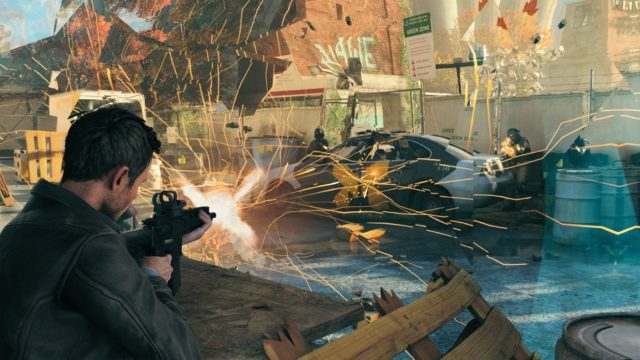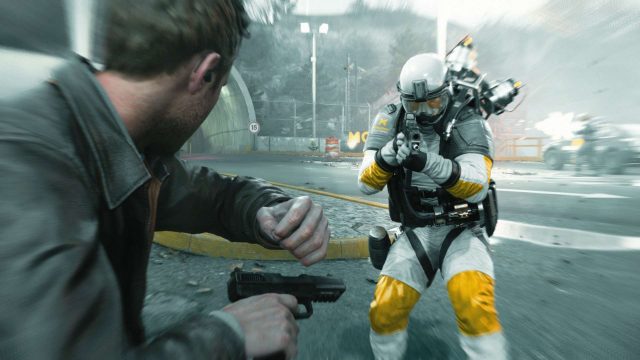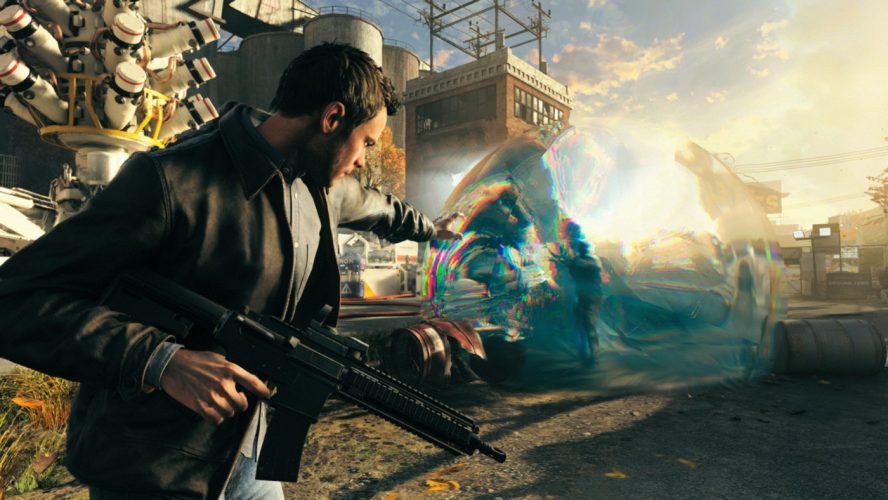- Shares
- 50
I’ve always believed that a good time travel story is hard to do, because there are usually multiple story loops that need to be closed in a satisfactory manner.
This is where many time travel stories fall short, because they either leave things hanging, pull a deus ex machina to resolve important plot points, or ultimately spiral out of control.
Video games have often played host to the concepts of time travel and manipulation. With Quantum Break, Finnish developer Remedy Entertainment aims to tell an engaging and compelling story revolving around that theme.
While the final product may have some flaws, I’d say they have largely succeeded.

Despite it’s science-fiction roots, Quantum Break is very much a character-driven tale. While the player spends the vast majority of the game filling the shoes of Jack Joyce (played by Shawn Ashmore), I felt that he wasn’t really the hero of the story – the game does an excellent job of showing how events unfold before the eyes of the supporting cast, giving the player some welcome insight into their behaviour and motivations, as well as visibility into their actions.
This creates a level of depth rarely seen in other similar 3rd-person action titles, where the narrative tends to be constrained to the perspective of the protagonist. This is achieved through a number of methods.
At the end of every gameplay segment, a “Junction” is reached where the player briefly takes control of the primary antagonist, Paul Serene (Aiden Gillen), the leader of Monarch Solutions, a mysterious and powerful corporation that has apparently developed time travel technology.
Obviously, such technology in the hands of a shady corporation can only spell trouble, and Jack, along with his brother William (Dominic Monaghan) must put a stop to Paul’s less-than-benevolent plans. There’s more to it, of course, but I will refrain from spoiling too much in this review.

During a Junction, the player has the ability to influence Paul’s actions and fundamentally alter the course of the future, with far-reaching effects that manifest in the story, as well as in gameplay.
An early decision requires the player to deal with a sensitive eyewitness to Monarch’s misdeeds, and the player’s choice here has an immediate effect not just in the following act, but also shifts the difficulty of a particular section of the game for Jack, much later on. Public opinion is a powerful tool, indeed.
Diverging paths with ramifications down the line are pretty common in video games these days, but Remedy has gone a step further with their approach to storytelling in Quantum Break. The game is really made up of 3 major components – playable segments with Jack called “Acts”, the aforementioned “Junctions” where players get to determine Paul’s actions, and an episodic live-action TV show that plays at the conclusion of each Junction.

Each of these live-action segments are about 20 minutes long, and take into account the player’s decisions in the preceding Junction. As such, they would play out very differently for players who have made different choices during gameplay.
This is also where most of the perspective shifts take place – Jack himself has barely any screentime on the show, and the consequences of the player’s actions are shown through the eyes of a number of supporting characters, all of whom have an integral part to play in the grand scheme of things.
Few actual TV shows devote as much time and effort into developing their supporting cast, and Remedy has been able to squeeze a remarkable amount of detail and world-building into just a handful of episodes.
It’s the sort of thing that only realizes it’s full potential upon repeated viewings, where players would pick up on hints and plot points that they might not have noticed before. Given that one would not be able to experience everything Quantum Break has to offer in a single playthrough, this is highly encouraged.
The folks at Remedy have established themselves as masters of cinematic storytelling with their past titles, and Quantum Break does not disappoint in this regard.

As a 3rd-person shooter, Quantum Break is competent enough. There is a non-“sticky” cover system in place, which is triggered by simply moving up to a low wall or pillar. While Jack is relatively nimble on his feet, I couldn’t help but feel a peculiar level of “looseness” and imprecision to his movement.
There were numerous instances where I took just a single step too far away from cover due to this lack of precision, and found myself exposed to incoming enemy fire – often at the worst possible time. A lore-friendly explanation would be that Jack isn’t a trained soldier in the first place, and I can accept that. Still, I would have preferred a tighter and more responsive control scheme.
On the flip side though, if you play this game like a traditional shooter, you’d be doing it a disservice. Quantum Break sets itself apart from other shooters with the variety of time-based powers at Jack’s disposal. With these abilities at your fingertips, the game somewhat feels like Mass Effect on steroids.
If all you do is duck down behind cover and take potshots at the enemy, you’re doing it WRONG.

Every firefight seems to have been designed to play out like an elaborate dance. Jack can zip around the battlefield like the Flash, freeze bad guys in place, deflect bullets, and execute brutal melee takedowns in slow motion. All of these abilities have their own cooldown timer, and players are encouraged to string them together in creative ways.
By finding “Chronon Particles” strewn throughout the game’s levels, Jack can upgrade his abilities for even greater effect over the course of the game. In the 10-11 hours or so I took to finish Quantum Break, I never got tired of running circles around enemy combatants and systematically taking them apart one by one. Their slowed-down cries of shock and surprise as I vanish from their sight, only to reappear right next to them in an instant was music to my ears.
Usage of these powers coupled with satisfying gunplay made for a truly visceral experience. The range of firearms available to Jack comprise of the usual gamut found in most shooters – handguns, submachine guns, assault rifles, shotguns, and the occasional specialty weapons such as marksman rifles and LMGs.
The guns feel great to fire off (these guys made Max Payne after all), and Remedy have deliberately kept ammo counts low to encourage players to not just make efficient use of their powers to help things along, but also for them to constantly stay mobile and pick up dropped weapons from fallen enemies.
I found myself swapping guns while under fire quite a bit in Quantum Break, and that only served to increase the tension and intensity of any shootout I was in – which was perfectly fine by me. I only wish there was some kind of experimental sci-fi weapon to fit the theme of the game, but this is just a minor gripe.

All of the above would be pointless if you only have typical faceless goons to fight over and over again, and the developers know better than to do that. As Jack progresses through the game, he starts to encounter higher-ranking Monarch soldiers who can mimic or even counter his abilities, forcing a change in tactics when these combatants show up during a firefight.
Some are able to move just as fast as Jack can, while others are heavily-armored and can nullify Jack’s powers within a certain radius. The addition of these enemies keeps things fresh, and the player must adapt to their presence on the battlefield or risk losing the advantage in, quite literally, the blink of an eye.
The Final Verdict
While the controls and gameplay could use some additional fine-tuning, and the story could have been tied up better (the game does suffer from the inevitable sequel-bait ending), I absolutely enjoyed my time with Quantum Break and have already embarked on a second playthrough with the goal of seeing how things could play out differently.
Quantum Break is definitely not your typical 3rd-person shooter. Remedy have successfully combined elements of science fiction, a strong character-driven narrative, excellent presentation and high production values to make something truly unique, and dare I say, extraordinary.
GEEK REVIEW SCORE
Summary
Overall
8.3/10-
Gameplay - 8/10
8/10
-
Story - 9/10
9/10
-
Presentation - 9/10
9/10
-
Value - 7/10
7/10
User Review
( votes)Brian loves video games, gadgets, and comic books – in other words, all things geeky. Obsessed with lifting things up and putting them down repeatedly, he also loves ice cream, putting things together, and the occasional good book.












